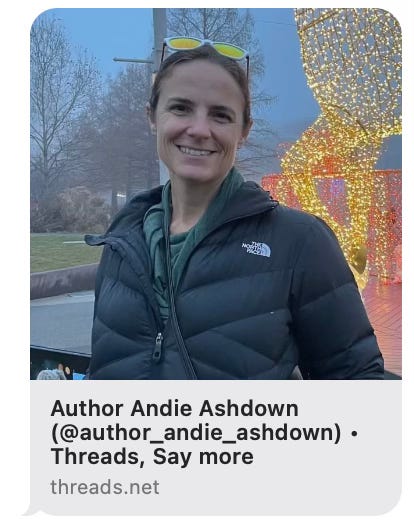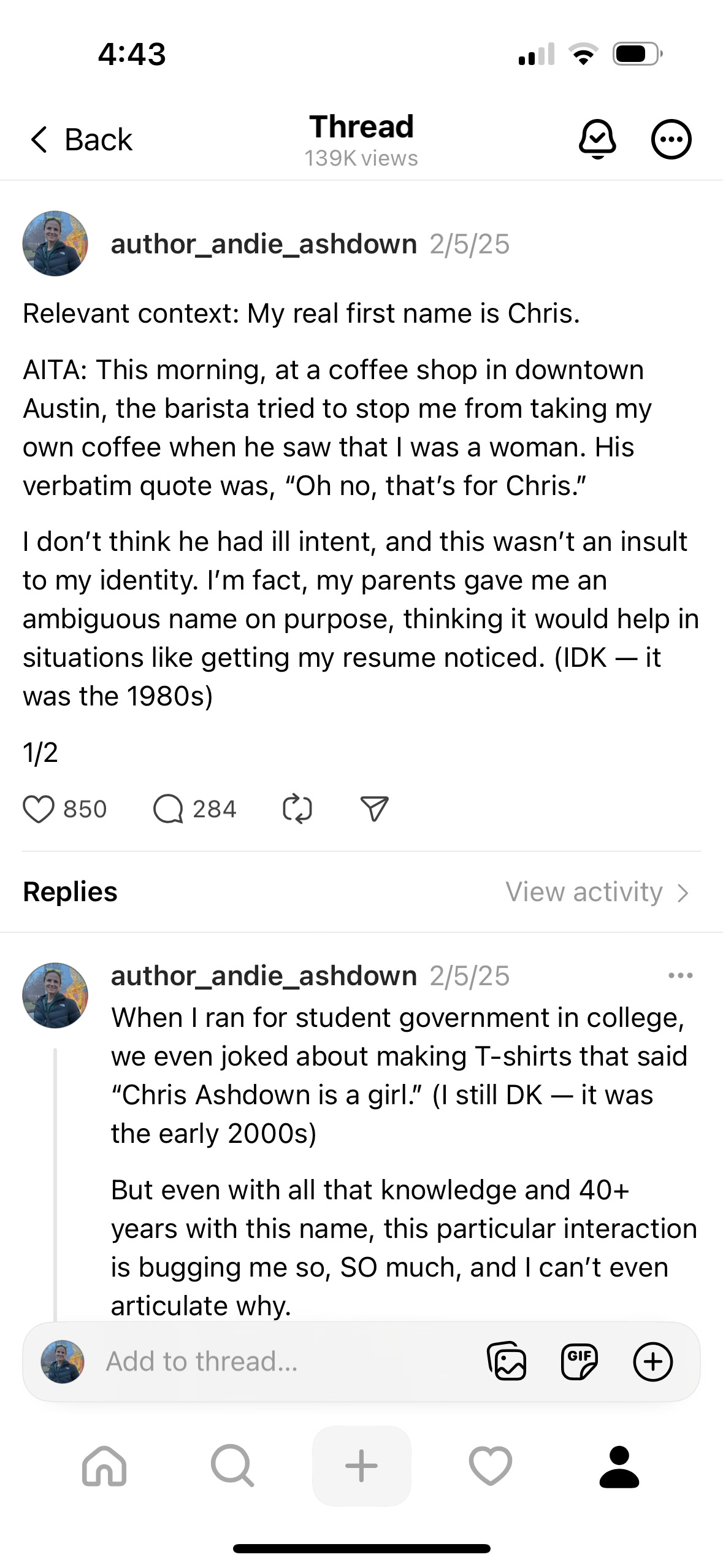I’ve written before about my social media experiments, mostly in essays I could now call “laments.”
As a person of a certain age (AKA, not old, but old enough to remember life before the internet), social media can feel like a non-native space for me. Yeah, my generation was the first to adopt it, but we who had MySpace pages are now largely perplexed by the more skill-intensive platforms.
I’m not a video editor, so TikToks take me hours to compose.
I’m not a photographer, so my Instagram is an uncurated mess.
I’m not an audio producer, so “starting a podcast” sounds skill and capital prohibitive.
And don’t even get me started on the platform-led pushes to grow and monetize this Substack.
ICYMI
Memories of that time I thought I should get good at TikTok…
Still, I Accept That I Need a Social Media Presence
This is a bit of a “hot take” in publishing, a world that heaps unwelcome pressure on largely introverted people (authors) to promote and sell their own books. “Don’t even bother pitching a book if you have less than 10,000 followers” is a standard refrain on the non-fiction side of the publishing world. (We should probably all check in on our favorite non-fiction authors, because spending that much time on social media isn’t good for anybody.)
And yet…how can any creator realistically market anything at scale without social media? There’s no longer a Yellow Pages1 to list a year-long ad. There’s no “Classifieds” section of your local newspaper. Heck, you’re lucky if you still have a local newspaper. I personally have come to believe the following unfortunate reality about modern-day marketing.
If you're a creator seeking a remotely accessible way to mass market your work, social media is it.
In Other Words, Pick a Platform and Try
Or, be like me, and pick a bunch of platforms and try. You might suck at them—I did (do?)—but eventually you’ll find one you hate a little less than the rest.
For me, that’s Threads, Meta’s Twitter clone that drew the masses of us who jumped ship around the time Elon walked into their corporate headquarters inexplicably carrying a kitchen sink.

My Threads follower count isn’t huge, but it’s doubled in the past 90 days, thanks largely to the platform’s vibrant author community. Even more amazing, while its algorithm is, like all of them, mysterious and fickle, it periodically chooses to blast something I say to the masses.
Threads has been the first platform to give me a true taste of virality.
I’ll do a deeper dive on Threads specifically in a future post, but I suspect the surprisingly emotional arc you experience as the creator of a viral post is roughly the same across platforms. As you might expect, that arc is not necessarily a rainbow.
The Emotional Arc of Virality
Quick Context: Threads is a storytelling platform, so a type of post that often does well is a narrative that invites opinions on an ambiguous situation. I shared one of these earlier this month, posed as an “AITA” (am I the a-hole?) question. This is a format first popularized on Reddit that is designed to invite conversation, so it has a high “viral” potential if people get interested in the topic.
The closing sentence, which didn’t quite fit in the screenshot, was:
“AITA for being bothered?”
What happened next was what I have come to think of as the emotional arc of virality. Yes, it’s a bell curve. Don’t worry, you’re not being graded.
What’s Happening at Each Point on the Curve
A Few People React Immediately—Like many platforms, Threads has an economy of scale. When I follow people, the algorithm shows me not just what those people post themselves, but things they interact with. If a post gets a few likes, or even better, comments, within its first fifteen minutes of existence, that’s a strong sign it’s going to perform well, because the scale of interactions will combine nicely with another attribute most social media platforms reward: recency. (If a Thread is older than 2 days, it’s virtually dead.)
Comments Pour In—Again, all comments are gold, since they drive your post onto folks’ “For You” page in a manner reminiscent of that movie most of us never actually saw, Six Degrees of Separation. This is an interesting phase in your post’s life, because you’re enjoying and appreciating the activity, but also seeing the same comment over and over and wondering why people don’t bother to check if someone already said the exact same thing. (In my post above, this was a lot of folks agreeing that “Chris” is a gender-neutral name, so I was inclined to appreciate their affirmation.) Every platform has cultural norms around handling comments, but for the first few at least, I try to respond, both because it feels like the decent human thing to do, and because even my own comments will likely boost the “engagement” level of a post.
Consider this hour of your life hijacked, but you’re on board because you’re building momentum.
Constant Refresh and Basking in the Reposts—Now that the engagement is high, likes and comments are coming in faster than you can keep up with, and some folks are even reposting your post. The dopamine hits are constant, and you’re probably staring gleefully at your phone as the numbers just go up and up.
Consider this hour of your life also hijacked, but now you’re not actively doing much, you’re just addicted to the feeling of affirmation.
Contrarians and Bots Show Up—If, like me, you aren’t the type of person to purposefully post “poke the bear” comments, this is when things start to go downhill. I could have written my initial post in a way that took a much firmer line on how I feel about gender assumptions. (Don’t make them.) It might have gone even more viral, but those initial commenters would have shown up with the verbal equivalent of flamethrowers. Fighting in the comments is good for engagement, but I hate to see it, because it’s divisive and people start to get purposely hurtful. When it starts to show up for me, I typically let the more “minor” counterpoints stand in the name of dialog and hide or block people who show up with flamethrowers. For example, I let this comment stay up, even though it made me personally feel hurt.
But I took down two other comments, which I will not repost here, which were such vitriolic anti-trans rants that reading them made me sad for humanity. They were the sort of thing designed to be hurtful to anyone in that community, and I didn’t want that hurtfulness spread under my name.
This is a span of 2-3 hours where you start side-eying your phone like it’s going to attack you.
Dopamine Dries Up—Now that you’ve been reminded that some people—maybe they’re bots, who knows?—simply enjoy being mean on the internet, your viral post has become a source of sadness and introspection. If you get enough mean comments, it becomes tempting to delete the whole thing, even though you know that would run counter to your goal of growing engagement. At this point, the likes are slowing down, so the dopamine is gone and you’re just monitoring for jerks.
This is a depressing few hours of your life.
Alone in a Field Once Again—With any post, usually sometime around the 48-hour mark, there comes a point where all the reactions dry up. You go from feeling tied to your phone for the better part of a day to wondering if there was any meaning to the way you spent that day.
This is when you readjust to reality, reminding yourself that life does not actually transpire entirely on the internet.
Is It Worth the Ride?
That’s a personal decision. Every time I have a “big” post—my biggest has about 800K views—I gain maybe 10-15 followers. Not a great conversion rate by any measure.
But hey, maybe those were 10 people who actually looked at my profile and decided they were genuinely interested in an elder Millennial writing romances about running? Maybe they’ll actually…buy a book one day?
Actually, yes. Let’s go with that. Whenever I do finally sell this book, I’ll gleefully inform my publisher that we can attribute at least 10 of those sales to that one time I asked the internet if I was an a-hole for wanting a barista to give me my latte.
Technically, the Yellow Pages still exist, primarily in the form of a web site. When was the last time you visited it?








